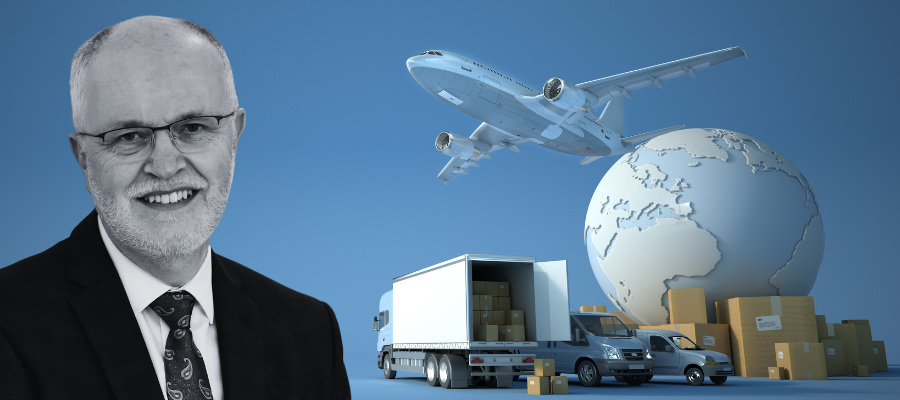🕒 Article read time: 2 minutes
Delivering decarbonisation is “top priority”, says Logistics UK's Chief Executive

Decarbonisation is a top priority for the logistics sector as the UK deadline of net zero by 2050 draws closer. Together, the sector has been working proactively to share knowledge and participate in trials to introduce new technologies and explore opportunities for modal shift. However, despite industry’s drive to decarbonise, significant barriers remain.
“One of the largest challenges industry faces is financial,” says David Wells, Chief Executive at Logistics UK. “At a time when inflation has soared, total road vehicle operating costs have risen by 12.6% and energy support is being reduced, operators are being expected to source additional funds to invest in decarbonisation.”
VOLATILE COSTS
Logistics UK’s 2023 Electric Vehicle (EV) report – released on 11 May 2023 – finds cost is a significant barrier to EV uptake, with businesses reporting costs between £100,000 and over £1 million to upgrade depot energy supplies. Energy prices are also proving volatile, with one business told that every additional megawatt of electricity will cost around £5,000. Along with a lack of meaningful scrappage schemes, and increases to vehicle acquisition costs, operators are facing an uphill battle.
“For those that have made the switch, they are facing struggles with public charging infrastructure,” says Wells. “As of 1 January 2023, there was a total of 37,055 public electric chargepoints recorded in the UK, an increase of just 7% when compared to 1 October 2022. Monthly installations will need to rise by 288% to meet the 300,000 by 2030 target set by the Department for Transport (DfT).”
CHARGEPOINT FRAMEWORK
Businesses have also expressed significant frustration with the public chargepoint network, reporting difficulties in finding available chargepoint space, and many encountering broken or inoperable chargers, as well as issues surrounding their suitability for commercial vehicles – which typically need larger spaces, rapid charging facilities and longer reach cables.
“To address these issues,” says Wells, “Logistics UK is calling for government support through tax allowances for capital expenditure on green infrastructure, as well as a fair and equitable approach to funding depot electricity connections, including for the plug-in grant to be made available to fund connections and charging infrastructure. Regarding public charging, Logistics UK is calling for an urgent EV charging and refuelling infrastructure roadmap designed in collaboration with operators, backed with clear guidance and incentives for local authorities.”
MORE UNCERTAINTY
For larger logistics vehicles, such as HGVs, ships and rail on non-electrified lines, there remains significant uncertainty regarding the most viable alternatives. Government-backed HGV trials are taking place too slowly; Low Carbon Fuels (LCFs) are an excellent short-term solution for immediately reducing carbon emissions by up to 80%, however, they come at a high cost and lack the necessary infrastructure.
“Logistics UK is calling on government to urgently produce a LCF strategy that provides certainty from government regarding future infrastructure investments to allow businesses greater clarity on which alternative fuels to adopt,” continues Wells.
“In aviation, questions remain over the costs of producing and using Sustainable Aviation Fuel (SAF). Logistics UK is calling for production of SAF to take place domestically to ensure that costs are reduced and availability is increased.
NEXT STEPS
Logistics is a highly interconnected industry and to decarbonise requires a multimodal approach. As an island nation, 95% of GB trade measured by tonnes arrives at our shores by sea, with onward travel often via road or rail. To unlock the environmental benefits of modal shift to rail – with each freight train able to remove 76 lorries from the road – infrastructure investment is needed to add capacity and establish more facilities for road-rail interchange, as well as upgrading rail connections at the ports.
A long-term plan for rail electrification – according to Logistics UK’s Decarbonising Logistics Report 2022, only 38% of the rail network is electrified – is then needed to bring down emissions even further.
“Overall, industry is exploring all options for transitioning to a greener economy. Logistics UK and its members are engaging in several encouraging conversations with government, however, the necessary steps must follow these,” summarises Wells.
“As noted by the Intergovernmental Panel on Climate Change (IPCC), catastrophic environmental impacts are rapidly becoming inevitable and it is ‘now or never’ to take drastic action to avoid disaster.”
*www.logistics.org.uk/campaigns
Published On: 25/05/2023 16:00:00

Comments Section
If you are a Logistics UK member login to add comments.